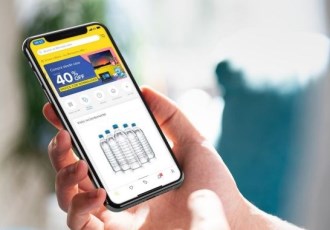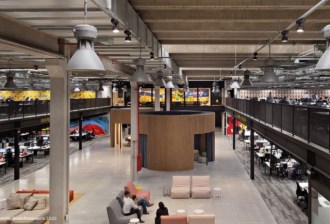

Company of the Year: MercadoLibre
Revenues and net income jump at Latin American online retailer.
BY JOACHIM BAMRUD
Latin American online retailer MercadoLibre has had a blockbuster year.
While full year results are not yet ready, they have already surpassed last year’s revenues of $7.1 billion. During the first nine months this year, revenues reached $7.5 billion, a 54% increase from the same period last year. Net income soared 146% to $317 million, nearly four times the net income for all of 2021, which stood at $83 million.
The fourth quarter will likely provide further good news due to Christmas shopping and the surprising results from Black Friday last month. In Brazil, MercadoLibre recorded the best Black Friday in its history. MercadoLivre (as the company is known there) saw a 10% increase in gross sales, while the e-commerce market in general fell by 23%, according to an analysis by NielsenIQ|Ebit.
In November, Fitch Ratings affirmed MercadoLibre’s Foreign and Local Currency Long-Term Issuer Default Ratings at ‘BB+’, with the rating outlook stable.
“MELI’s ratings reflects its leadership position in the competitive and underpenetrated e-commerce sector in Latin America, high geographic footprint across the region and the expectation that leverage will improve as the company strengthens its cash flow,” it said in a statement. “Fitch also considered MELI’s adequate liquidity and the favorable long-term fundamentals for the industry.”
However, the high relevance of the operation in Argentina is a negative factor, Fitch added.
Although the ratings agency sees MercadoLibre’s Gross Merchandise Volume (GMV) growth continue decelerating compared with the pandemic year of 2020, it expects the company to see an increase of 15% next year.
“MELI’s ratings reflect its leadership position in the e-commerce and payment solutions in Latin America, its geographic footprint across 18 countries in the region and diversified service offering,” Fitch says. “MELI’s scale and verticalization through marketplace, classified, advertising, logistics, payments and credit are key competitive advantages difficult to replicate. Long-term industry fundamentals remain positive, and MELI will continue to benefit from ongoing shifts to online shopping and digital payments.”
Latin America is still highly underpenetrated, as only 10%-12% of retail sales are online, and roughly half of the population lacks adequate access to financial services, the ratings agency points out.
TOP MARKETS
Fitch is particularly bullish on MercadoLibre’s outlook in Brazil, its top market that accounts for 55% of consolidated sales. “Besides being MELI’s largest market, Brazil also offers strong long-term growth potential,” it says.
MercadoLibre is in talks with Meta to process payments on the WhatsApp messaging service starting in Brazil, Reuters reports. Brazil is the second-largest market for WhatsApp worldwide, with 148 million users, according to eMarketer.
During the first nine months this year, Brazil revenues grew 48.5% to $4.1 billion. Brazil also accounts for the largest number of employees – 12,398 as of December last year.
Despite the difficult economic situation in Argentina, it was the fastest-growing for MercadoLibre among its top three markets. Revenues grew 69.2% to $1.8 billion during the January-September period this year. Argentina accounts for the second-largest number of employees – 9,126 as of December last year.
Mexico is the third-largest market for MercadoLibre, with sales the first nine months reaching $1.3 billion, up 61% from the same period last year. Mexico accounts for the third-largest number of employees – 4,038 as of December last year.
MERCADO PAGO
MercadoLibre’s payment system Mercado Pago is also showing strong growth.
“MercadoPago has fast become one of the most lucrative parts of the business,” the Financial Times reports. “The fintech unit has tapped into the millions of Latin Americans who remain poorly banked — as many as half of all adults — by offering an easy-to-use alternative.”
Payments totaling $77 billion went through the app last year — a 55% increase on 2020, it reported.
MercadoLibre envisions Mercado Pago as “a powerful disruptive provider of end-to-end financial technology solutions that will generate financial inclusion for segments of the population that have been historically underserved and operate in the informal economy today,” it said in its annual report for 2021.
“We are democratizing finance as well as commerce in Latin America,” company founder Marcos Galperin told the Financial Times in April. “I wasn’t expecting it to happen so quickly.”
FIGHTING COUNTERFEITS, HELPING ENVIRONMENT
MercadoLibre has also focused on fighting counterfeit products and helping the environment.
In August, it filed a first joint action against counterfeiters in Latin America. Together with Tommy Hilfiger, MercadoLibre launched an ongoing legal action before the 2nd Police Precinct of the Cyber Crimes Division (DCCIBER), in São Paulo.
“Through this action, counterfeit products of the aforementioned brand were seized, leading to an investigation of 14 individuals allegedly involved in the selling of counterfeit products,” it said in a statement.
“This action is the result of teamwork involving the brand, the platform, and local authorities.”
The legal action was carried out within the framework of the Anti-Counterfeiting Alliance, launched by MercadoLibre on November 30, 2021, with the aim of implementing a joint effort in the fight against online marketing of counterfeit and pirated products in Latin America. Currently, 11 brands are part of this 100% collaborative initiative, including Tommy Hilfiger, which has been part of the alliance since its inception.
Meanwhile, in June MercadoLibre announced that it will invest $18 million to support initiatives for the regeneration and conservation of biomes in Latin America through the Regenera América Program.
The company was originally founded in Argentina in 1999 but moved its headquarters to Uruguay last year. Galperin — who himself had been spending most of his time in Uruguay the past two decades, according to iPro — has long praised Uruguay’s business climate as better than that of Argentina as well as with fewer social conflicts and lower crime than his native country.
For its impressive achievements this year and continued strong potential, Latinvex names MercadoLibre Company of the Year.
© Copyright Latinvex
| Mercado Libre | |||||
| Revenues in millions of US dollars. Percent change with same period a year earlier. | |||||
| Period | Revenues | Ch | |||
| 3Q 22 | $2,690 | 44.80% | |||
| 2Q 22 | $2,597 | 52.50% | |||
| 1Q 22 | $2,248 | 63.10% | |||
| Total | $7,535 | 53% | |||
| Period | Net Income | Ch | |||
| 3Q 22 | $129 | 36% | |||
| 2Q 22 | $123 | 81% | |||
| 1Q 22 | $65 | 291%* | |||
| Total | $317 | 146% | |||
| *Loss of $34 million in 1Q 21 | |||||
| Sources: Mercado Libre, Latinvex | |||||












